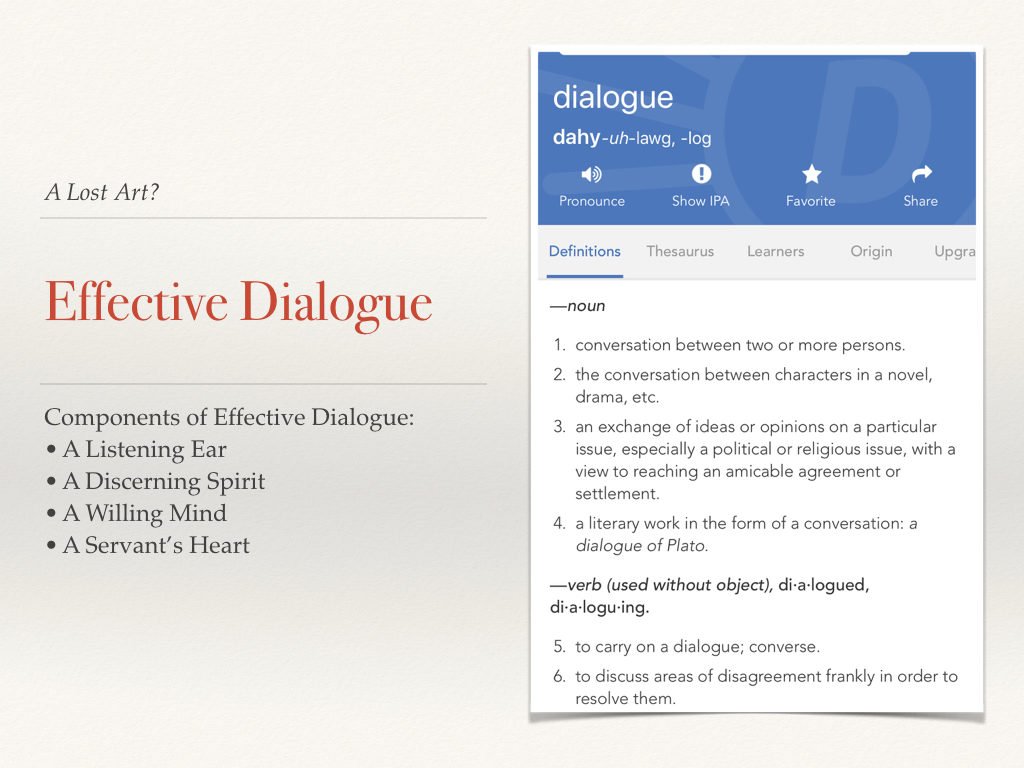Has dialogue become a lost art? I pondered this question as I read the latest news, surveyed the latest posts in my social media feeds, and listened to prognosticators on TV and radio give their opinion. It seemed like the proclamations and posts on both sides of the issue of the day were more about shouting to be heard versus seeking to understand and discover a solution. It made me wonder if we have lost the art of having an effective dialogue as a society in order to find common ground and unite around some fundamental principles, core values, and virtues that transcend race and socioeconomic background.
In my work with leaders in sports, business, and life, we have found that the best leaders and teams truly understand how to communicate with each other and find a way to have effective and constructive dialogue when issues arrive. Trust is one of the foundational elements for true teamwork to exist. Courage, authenticity, and vulnerability also have to be prevalent in order for individuals to come together. With these core values as the backdrop, here are 4 things that the best leaders utilize to have effective dialogue with their teams:
- A Listening Ear – You have probably heard the old adage that we have two ears and one mouth for a reason. Yet, we sometimes speak more than we should and listen less than we could. Great leaders pursue conversation with others with a listening ear. They don’t think of listening as a pause in the conversation where they are waiting and thinking of what they will say next. They seek to understand what the other person is communicating both verbally and non-verbally. They ask clarifying questions and actively listen to the facts and feelings of the moment.
- A Discerning Spirit – The best leaders also have a discerning spirit where they discover meaning in the conversation. There is a depth to the dialogue where the two people feel heard and understood and mutual respect is present. Practically, this could be the ability to repeat back – both in terms of feelings and facts – what the other person is striving to communicate. It could also be as simple as saying “I understand how that makes you feel.” When leaders exhibit a discerning spirit, it helps them attach meaning to the moment, which facilitates a drive to constructive action.
- A Willing Mind – Great leaders also exhibit a willing mind to try and understand different viewpoints and perspectives. The best leaders and teams that I have worked with and researched over the years are lifelong learners, and they never lose the desire to learn and grow. While effective dialogue can often lead to agreement, the most basic level must be mutual understanding and respect, even if both individuals choose to disagree with the other person’s point of view. Civility in discussion is paramount to constructive progress and that begins with a mind that is willing to seek new and different insights.
- A Servant’s Heart – The best leaders approach teamwork with a heart that yearns to serve and unite others. Caring is at the core of a servant leader’s heart, and they passionately seek to discover the motivators and activators of their team, peers, and colleagues. They also seek to find common ground where they can use their platform and their sphere of influence to be a force for positive change and impact. They understand that life is not all about them, and they pursue a higher calling in life.
As my friend and colleague Mark Sanborn says, “You don’t need a title to be a leader.” Each of us has a platform whether it be your family, social media feed, workplace, church, school, sports team, and/or community. Think about your voice today and every day and consider whether you are serving as a catalyst for effective dialogue or just a trumpet who continues to play a solo long after the music has stopped. The art of dialogue is a two-way street. Both participants or sides of a conversation must exhibit these qualities in order for the dialogue to be productive.
I always look to the Bible and the example of Jesus, who I think was the greatest leader of all time, for the model of how to lead and act well. During His life on Earth, Jesus understood the power of the question and longed to discern what was in a person’s heart. He listened intently to what was being spoken and not spoken. He exemplified a willing mind and servant’s heart to impact people physically and, moreover, spiritually. And through all of this, He never wavered in His convictions, the truth, and His overarching purpose to bring people together in a relationship with God.
Let’s remember why we are here, pursue the essential and eternal things in life, and be leaders of positive impact, rediscovering the art of effective dialogue in the process.

